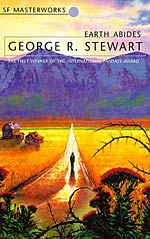
![]() Sable Aradia
Sable Aradia
8/19/2016
![]()
Read for the Apocalypse Now! reading challenge and the SF Masterworks reading challenge. August book for the Science Fiction Masterworks Book Club.
Method of the world's destruction: super-virulent airborne plague.
This is a powerful and thought-provoking book that I think everyone really ought to read. If you're lucky, you'll read it before you read Stephen King's The Stand. Now why would I say that?
Spider Robinson famously hated The Stand, and he offered it an often-quoted scathing review in which he encouraged people to hang around at bookstores just to convince customers not to buy it. I was puzzled by this, because having read The Stand when I was ten, and thus developing a lifelong fascination with apocalyptic fiction, I loved it myself. But now that I have read Earth Abides, I realize that a vast number of the most memorable scenes in The Stand were outright cobbled from this book, then taken to the next step. In particular there is a scene where the protagonist is standing outside of New York, contemplating the tunnels and deciding to avoid them because of the scenes of horror and car blockages he's likely to find within, where I sat up and I realized that Larry Underwood's horrible exodus of New York came from King reading that section and thinking to himself, "I wonder what would happen if he'd gone in?"
No discredit meant to King; I personally think there's nothing wrong with extrapolating on another idea (there's really no such thing as an original idea anyway) and he freely acknowledged that Stewart's post-apocalyptic classic inspired much of that work (and I also saw some of it was inspired by I Am Legend, which I mentioned in my review of that book). But I think it's worth noting that it seems that most of King's stock in trade is taking ideas from 1950s science fiction and putting a horrific twist on them. Again, nothing wrong with that, but I thought a lot of his ideas were one-off originals and I'm sure you did too, so it's important to set the record straight.
The premise of the book, as you might have guessed, is that an extremely deadly, virulent airborne plague spreads through the world and kills almost all of its human population in a matter of days. The protagonist of the novel, Ish (meant to be a symbolic reference to Ishmael, both Biblical and literary, as others have observed,) has what has now become a trope apocalyptic experience and he misses it because he lies near death in an isolated cabin where he was doing biological research because he was too weak to drive himself to town after a snake bite (just like Stu Redman in the testing facility, or Rick Grimes' coma). Utterly alone, Ish now travels the wreckage of what used to be the United States, observing the changes in the ecology, mostly avoiding other people who might be dangerous, and trying to survive the "Secondary Kill" (a phrase that I seem to remember from The Stand as well.) Many of its most memorable scenes were reflected in The Stand, but it's such powerful imagery that it haunts you.
There the stories diverge. King decided to take us into a fundamentalist Christian good vs. evil battle, using the premise that most of our technology was evil. Stewart contemplates that the human race is remarkably proud of its "civilization," and maybe it's just a lark in the grand scheme of the cosmos, something we have taken up due to overpopulation pressures and something that is likely to fall by the wayside when given an opportunity. And that, my friends, is a thought that I find sobering.
Within that is the personal question. What mark does any one of us leave on the world we leave behind, and is that the mark we intended to leave? Are we really the masters of our own fates, or simply victims of circumstance doing the best we can with what we have? Are we but brief candles in the vastness of the cosmos, despite our inflated opinion of ourselves as a species? Deep, emotionally impactful stuff that makes a person rethink their personal values and perhaps even one's entire philosophy on life. Better yet, the protagonist and the other characters are not superheroes; they're not the most suited people in the world for post-apocalyptic survival; they are ordinary people, mostly city dwellers, shown with all their incumbent merits and flaws. What's most wonderful about it is that it makes no attempt to be "edgy." Most current apocalypses tell us that people are animals and it will be every man for himself, so a tough, authoritarian leader will be necessary to see us through the crisis. In this book, a true social collective people survive by working together as best they can. Like in Alas, Babylon, I find it refreshing.
I think the message inherent in this book is especially pertinent in our present time, since we talk about "saving the earth." The Earth does not need to be saved, but it might need to be prevented from becoming inhospitable to us. The Earth does not care about us. It Abides.